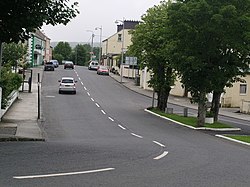This article needs additional citations for verification. (November 2010) |
Culdaff (Irish: Cúil Dabhcha)[2] is a village, civil parish and townland on the Inishowen peninsula of County Donegal, Ireland. Known for its beach, it attracts tourists from all over Ireland.[citation needed] As of 2022[update], the population was 385.[1]
Culdaff
Cúil Dabhcha | |
|---|---|
Village | |
 Main Street | |
| Coordinates: 55°15′N 7°16′W / 55.25°N 7.27°W | |
| Country | Ireland |
| Province | Ulster |
| County | County Donegal |
| Government | |
| • Dáil Éireann | Donegal |
| Population | 385 |
| Time zone | UTC+0 (WET) |
| • Summer (DST) | UTC-1 (IST (WEST)) |
| Irish Grid Reference | C467453 |
The present village dates back to the 8th century and was originally the site of the monastery of St Buadán (Baithéne mac Brénaind), after which the Church of Ireland is named. William Lawson Micks and Samuel Arnold Lawson, acted as Trustees for one hundred acres of bogland at Meenawarra near Culdaff on behalf of the purchaser, Jane Leferre.[3]
Culdaff Beach
editCuldaff beach is only about 50 yards away from the village. It includes two beaches, 'the small beach' and 'the big beach'. The beach can be very busy during the summer, and is known for the expansive sand on the main beach, and a large area of rocks around the second and further along the coastline.[citation needed]
Fishing
editThe Bunagee Pier is the mooring for two boats that take anglers out to fish, the Barracuda and the Gemini. Fish caught offshore include White Pollock, Black Pollock, Plaice, Rock Salmon, Sea Trout, and Salmon. Shell Fish include Brown Crab, Lobster, Green Crab, and Velvet Crab.[citation needed]
Sport
editThe main sport in Culdaff is football and the team is part of the Jackie Crossan Premier Division of the Inishowen Football League. Their home ground, Caratra Park, is next to the beach.[citation needed]
Places of interest
editAncient monuments in the area (located near the Bocan chapel) include the Carrowmore High Crosses, the Cloncha Cross, the Bocan Stone Circle and the Temple of Deen (a ruined court tomb). Other sights include St. Bodans Rock (located below the Bridge), and the site of old St Bodans well (located behind the Church of Ireland).[citation needed]
Notable people
edit- Charles Macklin (1699–1797), actor and dramatist
- Frederick Young (1786–1874), soldier
References
edit- ^ a b "Census Interactive Map – Towns: Culdaff". Census 2022. Central Statistics Office. Retrieved 29 October 2024.
- ^ "Cúil Dabhcha/Culdaff". Placenames Database of Ireland. Government of Ireland - Department of Arts, Heritage and the Gaeltacht and Dublin City University. Retrieved 10 June 2018.
- ^ Bonner, Brian (1982) Redford Glebe: the story of an Ulster townland, Donegal; p. 24
Further reading
edit- Peter Harbison, Guide to National and Historic Monuments of Ireland, Dublin, Gill & Macmillan, 1992, ISBN 0-7171-3239-0; pp. 96–97
- Lou Callan et al., Ireland; 5th ed. London, Lonely Planet, 2002 ISBN 1-86450-379-3; pp. 599–600
